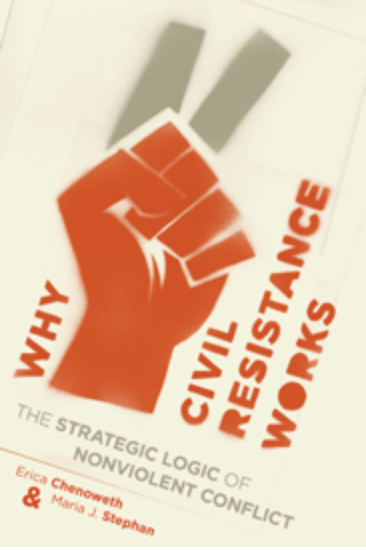Jeff Bezos makes a Bad Decision: An Introduction to Life Satisfaction

You've probably heard about this – and if you've heard about it, you've probably formed an opinion about it – but let me just put this here, so that we can all be on the same page:
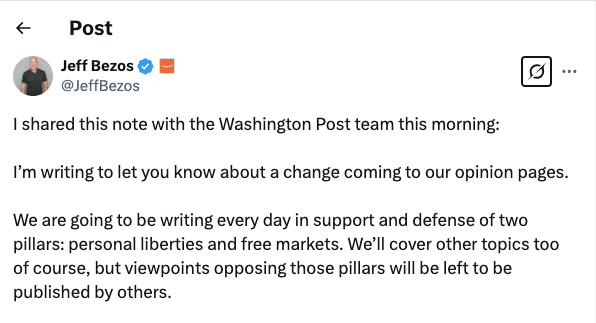
To you, my readers, this is probably, already, very clearly, a Bad Decision. Whether you'd argue that he's focussing on an incredibly small portion of reality, or worshipping an economic theory that's been perverted beyond recognition from its original form, I think you would have a powerful case. If you wanted to go there, I would even entertain the view that his later claim – "I also believe these viewpoints are underserved in the current market of ideas [emphasis my own]" – shows a level of cognitive dysfunction typically associated with brain injury.
Here – to show this is not just a cheap insult – is a list that required precisely one Google, and contains nine major, nationally active, institutional think tanks whose entire purpose and existence revolve around promoting free markets in "the current market of ideas."
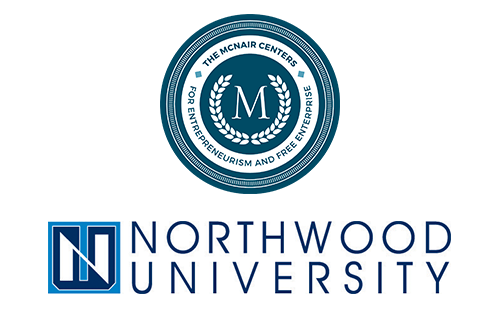
Four of them (AEI, Cato, Heritage, and Mercatus) are based prominently and visibly in DC, where Mr. Bezos lives. Together, they have (348 + 172 + 415 + 43 =) $978 million dollars in net assets. And this is just four of them. But even that pales to invisibility in comparison to the idea that the idea of freedom is unappreciated in the United States.

But for all the strength of those arguments – that's not the approach I would take.
I would simply say that Jeff Bezos' decision makes the world worse. And I would support that assertion with the following graph.
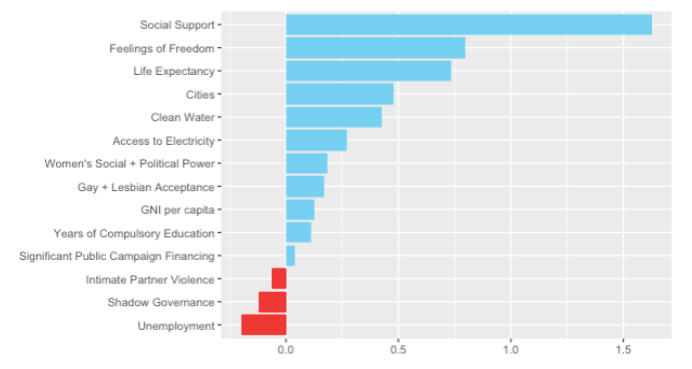
Going forward, we're going to spend a lot of time with this graph, a lot of time on the data it contains, and the things that it means. But for now, a short description should be enough. These 14 bars represent the top 14 factors, out of 1,058 that were tested, in predicting how much the people in a country liked their lives. Blue bars show a positive effect, red bars show a negative effect.
It might not seem like much at first; but here's a neat trick you can do with it:
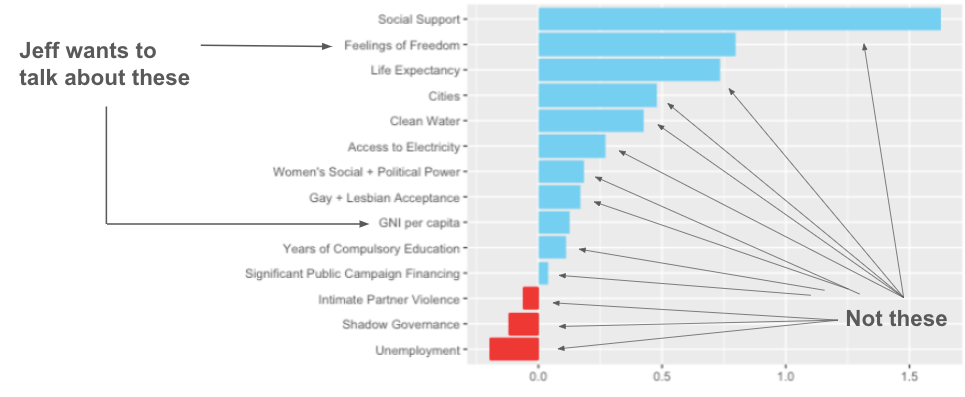
As the essentially-tied-for-second richest man on Earth rides out on his gilded eagle, blowing horns of freedom and prosperity; instead of being forced to fight, flee, or drop dead of exasperation, you can now simply say: "Well, those are basically the Second, and Tenth, most important predictors of a good life – and the larger one, "Feelings of Freedom," actually measurably conflicts with the, much larger than it, First one, Social Support. So in other words, why are you focussing on 18% of the things that matter – when Social Support alone predicts 30%?"
If you can see the implications of this right away, great. But it's not immediately obvious to most people. If this seems dry and dull and weak to you, well –
How shall I put this –
The world, dear readers, is a complicated place. Many things seem important – many things are important. But as we learn more and more about ourselves, it becomes increasingly clear that we do not always make the best decisions – for others, or even for ourselves. We lead unhealthy lives. We start trade wars. We impose draconian newsroom policies on storied institutions, and hollow out not only their staff and revenue, but also their basic credibility.
And yes we do this for a million reasons, and sometimes we know better – but I will argue into an early grave that an unbelievable amount of time, we don't actually know better. Because we don't have a great grasp of what makes life good.
In large part, I think this is because we often believe the answer is obvious. And like anything that's obvious, sometimes we're right, and sometimes we're catastrophically wrong. Lead! Cigarettes! Ethnic cleansing! Someone, somewhere, argued passionately that these would make life better. But it's also the case that it wasn't until 2005 (!!!!!) that the world had its first access to real, global, human, data on perhaps the simplest, and most important, question we will ever ask: "Is your life good?"
And with that data, we – for the first time in human history – can meaningfully answer the question that follows it: Well, what makes it good?
Before this – I'm sure you've been witness, or party, to at least one of these conversations – we were forced to take our enormous club-like arguments and simply smash them together. Freedom! No, Responsibility! The environment! No, markets! Trees! GDP! SMASH! And in the end, the largest smasher would win because nobody without a PhD in Forest Finance really knew how to compare trees to GDP, so money, charisma, and inertia were often the only easy ways to choose a side.

It is not the only one, but that is one way in which to describe the truly unique power of empirical, measurable, survey-collected and scientifically rigorous life satisfaction as an idea. Suddenly, you can compare things. You have a reason to choose one path, and not another. And now, the best-funded argument is no longer the one that always wins. In other words --
The Irreplaceable Power of Clarity
Using measurable life satisfaction as a compass gives you clarity.
Clarity about what is important, and what is not.
Is this clarity perfect? God no. I can hardly describe the amount of research that's still necessary, or how difficult it will be to do right. Is it the end of the story, not even close. Is it a clarity that will, of its own power, convince people who are both emotionally and financially invested in the moral dominance of other ideas, like "free markets"? Sweet baby Jesus we both know the answer to that. Will they attempt to co-opt, corrupt, or outright discredit it and me? Hold on to your hats.
But the one word that I keep hearing, to describe what's going on right now, is "chaos." The attacks on the United States, the tariff-ing, the un-tariff-ing, the theft, the court cases, the 19 year-olds, the purging, the de-purging, the re-purging – it's confusing, and it's meant to be. But in the midst of this chaos, which will continue until we stop it, I believe my role is to provide, even just a small, amount of –
clarity.
And clarity – even a small amount – can be an extraordinarily powerful thing.
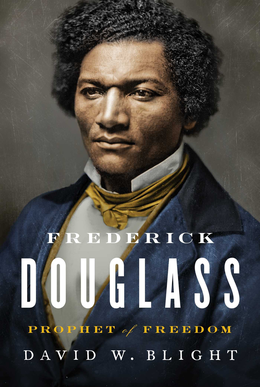
I recently finished David Blight's truly spectacular biography, Frederick Douglass: Prophet of Freedom. It got, and deserved, the Pulitzer. And for thousands of pages and dozens of years, you can watch as Douglass turns himself into an un-erasable figure in the halls of American history, carried by an engine of crystalline clarity around a single, simple, idea: that slavery is an abomination.
His language brought a unique beauty to the struggle, and his unceasing labor rocketed his impact around the globe. But none of it would have been possible if he had not known a short sentence, with an unblemished clearness: Slavery is an abomination. It is something everyone must hear, and everyone must know.
And we, ever and wonderfully a social species, saw his clarity, and followed it.
I want to provide that same clarity, to us, now. To blow away the clouds in which charlatans can hide. And human satisfaction is the tool I will use to do it.
In a single day now, I could try to raise alarms about Guantanamo Bay being prepared for immigrants, and then about the future of American disease research, and then about the economic impact of retaliatory tariffs, and the United States being graded internationally as no longer a democracy – and I would still be behind. And they would win. Which is why I am choosing a different approach.
Instead, what I want to provide is a way for us to think about everything that is happening. A way to add it together, and compare the paths that would be easy against the ones that seem frightening. A way to not just defend, or even fight back against the attacks we face now – but to point our way towards the place we actually want to go, today, tomorrow, and once this is all over. And the only – the only – meaningful way to do that, is to think about how much we would like the lives that we would have, if we did those things.
Which we can do with this graph. That today I have introduced, and going forward, I will explain. This is my promise to you.
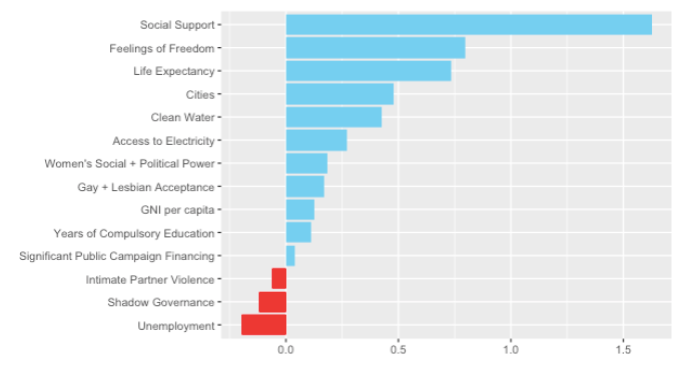
Oh Yeah, Jeff
Man, I almost forgot!
I think I'd be flogging a fetid foal if I were to keep pointing out why Jeff's decision is just stupid, but there is currently an unprecedented number of other targets at which to point this idea. The Executive Order against DEI? A direct attack against the 8th and 9th largest factors, Women's Social and Political Power and LGBTQ+ Social Acceptance. The evisceration of the EPA? Number 5, Clean Water. NIH? Number 3, Life Expectancy. Elon being allowed to run the United States Federal Government like it's his own personal ant farm? The second-largest negative factor, Shadow Governance! And on, and on, and on, and on, and on ...
Don't stop with, "Science is under attack!" Because only the people who care about science, care. Don't just say, "The government is being torn apart!" Because just a few years ago, you probably weren't very happy with the government yourself. Tie it back to something that can be compared. Tie it back to something about which we all care, no matter who we are or what we believe.
The Trump-Musk Administration is making life itself worse.
That is why we must stop them. And this is how we will stop them.
If you made it this far, and you haven't subscribed yet, I'd like to ask as a personal favor that you please subscribe, and share the newsletter with people you know. If I don't know that someone is listening, I have no reason to keep writing – and if I can't pay my rent, I have no ability to keep writing. With my profound gratitude to everyone, both paid and free.
And if we make it to Sunday, I'll see you Sunday.





